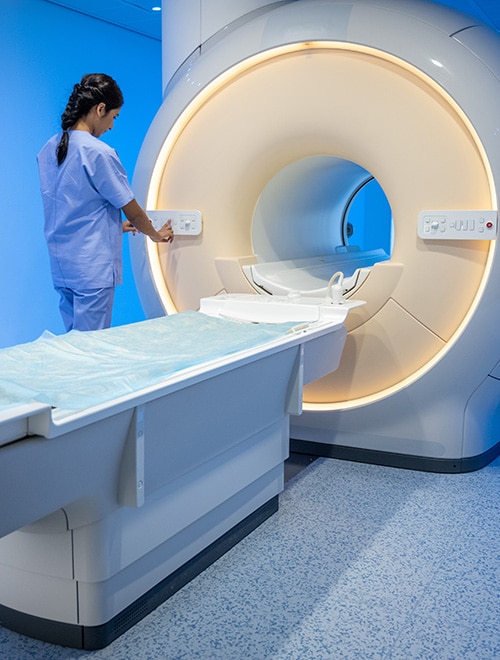- 6 min read
Why is PSA testing important in prostate cancer?
Every day in Australia, around 66 men are diagnosed with prostate cancer and 10 men will die. Even with those figures, prostate cancer has one of the highest survival rates of all cancers, with 95% of Australian men with prostate cancer surviving at least 5 years after diagnosis and 91% surviving 10 years or more. Fortunately, deaths in Australia from this disease have been gradually falling over the past 20 years.
Early detection and treatment are crucial for improving prostate cancer outcomes.
Early detection and treatment have been and remain crucial for reducing death rates and increasing the chances of survival for men with prostate cancer. Yet, our research shows that 75% of Australians don’t know the guidelines for prostate-specific antigen (PSA) testing – the most widely used test for identifying concerns with the prostate.
As prostate cancer may not show symptoms in the early stages, it’s vital for you to know your individual risk factors and to find out all the facts about PSA testing before deciding whether to be tested.
This toolkit aims to increase the awareness of PSA testing so that more cases of prostate cancer are detected early. We hope it helps you understand what PSA testing is, the potential benefits and harms, and the different types of PSA tests available, so that you can make an informed decision about your health and whether testing is appropriate for you.
What is PSA?
PSA is a protein made in the prostate, a walnut-sized gland that sits below the bladder and in front of the rectum in men. Some PSA enters the blood from the prostate.
Elevated PSA levels mean that there may be something going on with your prostate that needs further investigation
From around the age of 40 it is normal for your prostate to begin to grow larger and produce more PSA. PSA testing measures how mush PSA your prostate is making.
If your PSA levels are higher than they should be for your age it means that there is something going on with your prostate that needs further investigation.
What is PSA Testing?
PSA tests measure the levels of different forms of PSA in your blood.
There are currently 3 different types of PSA tests available in Australia. The first PSA test (simply called a PSA test) that you will have provides a measure of all the PSA in your blood (Total PSA). The is the most widely used test and your doctor will consider the result of this test along with your age and individual risk factors to work out if you need further PSA testing or other tests and examinations.
You can read more about the different PSA tests:
- PSA test – the most widely used test and the one you will most likely have first if you decide to get tested
- Free to Total PSA test – you may have this test if your PSA levels are constantly high
- Prostate Health Index – a newer test that measures 3 forms of PSA
Should you have a PSA test?
PSA testing does not diagnose prostate cancer, but it can be the first clue that something is not right with your prostate, and you may need more testing. If you are worried about prostate cancer, regular PSA testing can put your mind at rest.
Before deciding to have a PSA test it’s a good idea to ask your doctor about:
- Your individual risk factors
- Potential benefits
- Possible harms
- The evidence for PSA testing
- Whether testing is appropriate for you
It’s important to ask lots of questions, so you clearly understand what PSA testing involves and what happens if your PSA result is normal or elevated.
It can be stressful talking to your doctor about prostate cancer testing, so it may help to have some support. Think about asking your partner, family member or a friend to go with you when you see your doctor.
When should you talk to your doctor about PSA testing?
As age is a risk factor for prostate cancer, it is best to talk to your doctor when you are 50 years old. But if you have a relative with prostate cancer, your risk may be higher, so it’s best to talk to your doctor when you are 40 to 45 years old.
Bear in mind, if you have any changes or problems with urination, see your doctor straight away. Symptoms to watch out for include:
- Urinating more than usual (day or night)
- Poor urine flow
- Dribbling at the end of passing urine
- Slow to start the urine flow
- Feeling like you can’t fully empty your bladder
- Blood in the semen or urine – never ignore this symptom
- Pain on urination or ejaculation
- Back or pelvic pain
Remember though that in the early stages of prostate cancer you may not have any symptoms. If you do not have symptoms or urination problems, deciding to have a PSA test can be complicated. It’s important to talk to your GP or call a PCFA nurse for more information and advice if you have any concerns.
What are the current Australian guidelines for PSA testing?
The current PSA testing guidelines recommend:
- Men should be given the opportunity to discuss the benefits and harms of PSA testing before making the decision to be tested
- Men at average risk of prostate cancer who decide to be tested should be offered PSA testing every 2 years from age 50 to 69
- Men with a family history of prostate cancer who decide to be tested should be offered PSA testing every 2 years from age 40 or 45 to 69 (the starting age depends on the family history)
Note: The current guidelines show the potential harms of PSA testing may outweigh the benefits for men aged 70 and older.
What are the possible benefits of PSA testing?
PSA testing may detect a potentially harmful cancer before it spreads, improve the chances of treatment being successful and reduce your risk of dying from prostate cancer.
What are the potential harms of PSA testing?
Although PSA testing has many benefits in potentially detecting undiagnosed prostate cancer, they are not perfect tests.
PSA testing:
- Can give false positive results. This means your test is positive, but more testing shows that you don’t have cancer. This may make you and your loved ones worried and distressed, and you may end up having more invasive testing, like a biopsy, to find out you don’t have cancer.
- In very rare cases, your test results may show as normal, but it is later discovered that you do have cancer. This is called a false-negative result.
- PSA testing can sometimes detect prostate cancers that are not harmful. These cancers may never cause problems because they may grow very slowly or stay the same size.
What happens after you get the results of your PSA tests?
What happens next depends on the PSA test result and your age, family history, symptoms (if you have any), risk factors and the results of any other tests you may have had. You may have more PSA tests to rule out other factors that could be causing your high PSA levels, such as prostatitis, or the doctor may want to monitor your PSA levels over time. You may also be referred to a specialist (urologist) at a public hospital or in private practice for more tests. Urologists are doctors who are highly trained in prostate cancer.
Making an informed decision about PSA testing.
Ask your doctor about the latest eveidence for the potential benefits and possible harms of PSA testing and prostate cancer treatment.
Ask your doctor about your individual risk factors for prostate cancer. These will include symptoms (if you have any), medical history, family history, age and other risk factors.
Make sure you ask lots of questions before you decide if you will or won’t start PSA testing.
Need more information? Call a PCFA nurse.
What happens if your PSA levels are elevated?
A PSA test result that shows elevated PSA levels for your age suggests that there is something going on with your prostate that needs further investigation.
What happens next is unique to you and depends on your PSA result and individual circumstances, Some tests and examinations you may be offered include:
- More PSA tests
- Digital rectal examination
- Magnetic resonance imaging (MRI) scan
- Prostate tissue biopsy
Being tested for prostate cancer can be a very stressful process so make sure you seek support from family and friends and take time to look after yourself. You can also contact a PCFA nurse for more information and advice.
Key Points
- PSA tests are tools that can detect the risk of prostate cancer early and save lives.
- PSA tests do not diagnose prostate cancer. High or elevated test results do not mean you have prostate cancer.
- There are three PSA tests available:
- PSA test
- Free to Total PSA test
- Prostate Health Index
- It is important to weigh up the pros and cons of PSA testing, based on your individual situation, age and family history. Ask your doctor whether PSA testing is recommended for you.
- PSA test results may be positive when there is no prostate cancer. This may lead to more tests and unecessary treament.
- In rare cases, PSA levels can be normal when there is prostate cancer. Always see your doctor straight away if you have any symptoms.
- Your doctor or urologist will talk to you about what the PSA testing results mean for you. They will also discuss if further examinations or tests are recommended.






